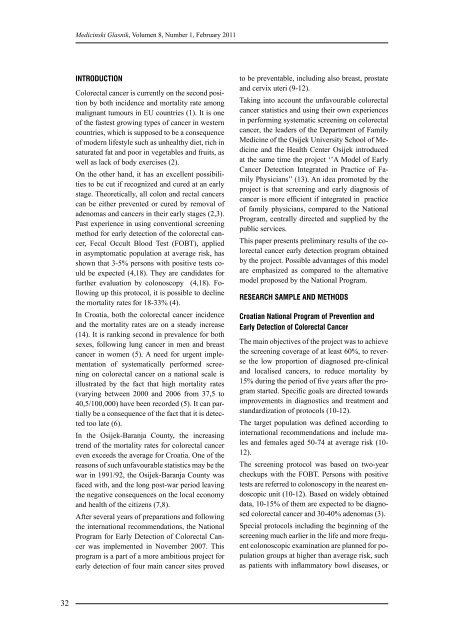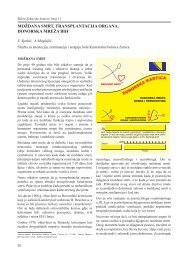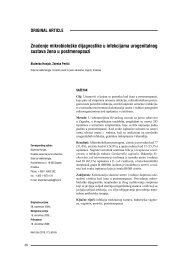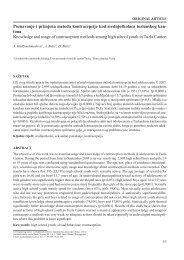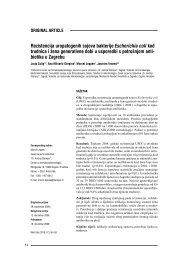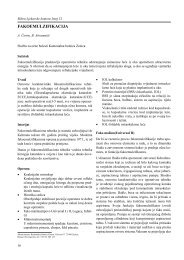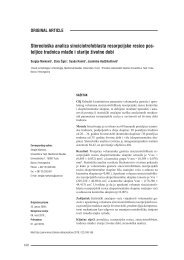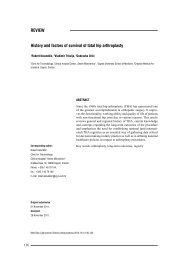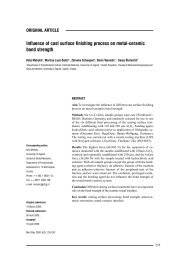MEDICINSKI GLASNIK - Aktuelno Ljekarska komora ZE - DO kantona
MEDICINSKI GLASNIK - Aktuelno Ljekarska komora ZE - DO kantona
MEDICINSKI GLASNIK - Aktuelno Ljekarska komora ZE - DO kantona
Create successful ePaper yourself
Turn your PDF publications into a flip-book with our unique Google optimized e-Paper software.
32<br />
Medicinski Glasnik, Volumen 8, Number 1, February 2011<br />
INTRODUCTION<br />
Colorectal cancer is currently on the second position<br />
by both incidence and mortality rate among<br />
malignant tumours in EU countries (1). It is one<br />
of the fastest growing types of cancer in western<br />
countries, which is supposed to be a consequence<br />
of modern lifestyle such as unhealthy diet, rich in<br />
saturated fat and poor in vegetables and fruits, as<br />
well as lack of body exercises (2).<br />
On the other hand, it has an excellent possibilities<br />
to be cut if recognized and cured at an early<br />
stage. Theoretically, all colon and rectal cancers<br />
can be either prevented or cured by removal of<br />
adenomas and cancers in their early stages (2,3).<br />
Past experience in using conventional screening<br />
method for early detection of the colorectal cancer,<br />
Fecal Occult Blood Test (FOBT), applied<br />
in asymptomatic population at average risk, has<br />
shown that 3-5% persons with positive tests could<br />
be expected (4,18). They are candidates for<br />
further evaluation by colonoscopy (4,18). Following<br />
up this protocol, it is possible to decline<br />
the mortality rates for 18-33% (4).<br />
In Croatia, both the colorectal cancer incidence<br />
and the mortality rates are on a steady increase<br />
(14). It is ranking second in prevalence for both<br />
sexes, following lung cancer in men and breast<br />
cancer in women (5). A need for urgent implementation<br />
of systematically performed screening<br />
on colorectal cancer on a national scale is<br />
illustrated by the fact that high mortality rates<br />
(varying between 2000 and 2006 from 37,5 to<br />
40,5/100,000) have been recorded (5). It can partially<br />
be a consequence of the fact that it is detected<br />
too late (6).<br />
In the Osijek-Baranja County, the increasing<br />
trend of the mortality rates for colorectal cancer<br />
even exceeds the average for Croatia. One of the<br />
reasons of such unfavourable statistics may be the<br />
war in 1991/92, the Osijek-Baranja County was<br />
faced with, and the long post-war period leaving<br />
the negative consequences on the local economy<br />
and health of the citizens (7,8).<br />
After several years of preparations and following<br />
the international recommendations, the National<br />
Program for Early Detection of Colorectal Cancer<br />
was implemented in November 2007. This<br />
program is a part of a more ambitious project for<br />
early detection of four main cancer sites proved<br />
to be preventable, including also breast, prostate<br />
and cervix uteri (9-12).<br />
Taking into account the unfavourable colorectal<br />
cancer statistics and using their own experiences<br />
in performing systematic screening on colorectal<br />
cancer, the leaders of the Department of Family<br />
Medicine of the Osijek University School of Medicine<br />
and the Health Center Osijek introduced<br />
at the same time the project ‘’A Model of Early<br />
Cancer Detection Integrated in Practice of Family<br />
Physicians’’ (13). An idea promoted by the<br />
project is that screening and early diagnosis of<br />
cancer is more efficient if integrated in practice<br />
of family physicians, compared to the National<br />
Program, centrally directed and supplied by the<br />
public services.<br />
This paper presents preliminary results of the colorectal<br />
cancer early detection program obtained<br />
by the project. Possible advantages of this model<br />
are emphasized as compared to the alternative<br />
model proposed by the National Program.<br />
RESEARCH SAMPLE AND METHODS<br />
Croatian National Program of Prevention and<br />
Early Detection of Colorectal Cancer<br />
The main objectives of the project was to achieve<br />
the screening coverage of at least 60%, to reverse<br />
the low proportion of diagnosed pre-clinical<br />
and localised cancers, to reduce mortality by<br />
15% during the period of five years after the program<br />
started. Specific goals are directed towards<br />
improvements in diagnostics and treatment and<br />
standardization of protocols (10-12).<br />
The target population was defined according to<br />
international recommendations and include males<br />
and females aged 50-74 at average risk (10-<br />
12).<br />
The screening protocol was based on two-year<br />
checkups with the FOBT. Persons with positive<br />
tests are referred to colonoscopy in the nearest endoscopic<br />
unit (10-12). Based on widely obtained<br />
data, 10-15% of them are expected to be diagnosed<br />
colorectal cancer and 30-40% adenomas (3).<br />
Special protocols including the beginning of the<br />
screening much earlier in the life and more frequent<br />
colonoscopic examination are planned for population<br />
groups at higher than average risk, such<br />
as patients with inflammatory bowl diseases, or


